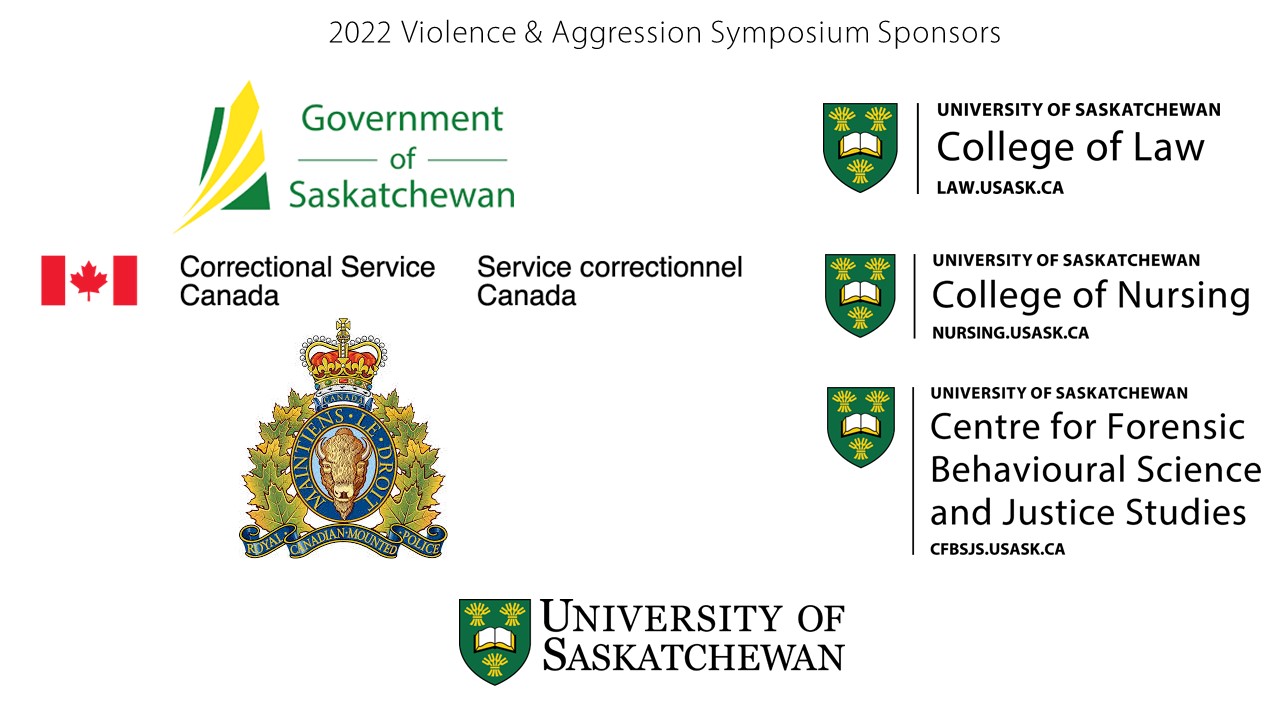Overview
19th Symposium on Violence & Aggression

The 19th offering (2nd virtual) focussed on our 'new reality' and how the pandemic has affected corrections and policing, including innovations in virtual programming, assessment, and interventions, as well as relevant topics associated with the overarching symposium themes of violence and aggression:
- Individuals and communities who have experienced trauma and symptoms of posttraumatic stress disorder;
- Trends, challenges, and concerns in corrections stemming from COVID-19;
- Indigenous health, mental health, and wellness;
- Virtual treatment services and ethical practice in a virtual world;
- Policing postures in the post-George Floyd Era;
- Opportunities to improve the health status of people who experience detention and incarceration;
- Reducing stigma and discrimination towards individuals with substance use disorder;
…and much more.
Program
Plenary Speakers
Monday May 30, 2022 - Day #1
Policing’s new reality: Police work in the post-George Floyd era
- Dr Gregory Brown, Assistant Professor of Criminal Justice within the School of Science, Health & Criminal Justice, State University of New York
Acknowledging the Impact of Past and Ongoing Trauma on Indigenous Health and Wellness: Possible Pathways Forward
- Dr. Holly Graham, Indigenous Research Chair in Nursing and Associate Professor, College of Nursing, University of Saskatchewan
Tuesday May 31, 2022 - Day #2
Trends, Challenges and Concerns in Federal Corrections: A Prison Ombuds’ Perspective
- Dr. Ivan Zinger, Correctional Investigator of Canada, Correctional Investigator (Federal Prison Ombudsman)
Ethical practice in a virtual world: Virtual research and service delivery to justice-involved clients
- Dr. Jill Stinson, Director of Clinical Training in the Department of Psychology at East Tennessee State University
Concurrent Sessions
Day #1 - Monday May 30, 2022
|
Mr. Gord Garner, Vice President Strategic Partnerships CAPSA Substance Use Health, Stigma and Policy |
|
|
Dr. Fiona Kouyoumdjian, MD MPH PhD CCFP FRCPC, Assistant Professor in the Department of Family Medicine at McMaster University The health status of people in correctional facilities in Canada |
|
|
Dr. Suzanne Stewart, Director of the Waakebiness-Bryce Institute for Indigenous Health at the Dalla Lana School of Public Health at the University of Toronto Indigenous mental health and reconciliation: What does this mean in front-line criminal justice work? |
|
|
Dr. Sandra Bucerius, Prison Needle Exchange Programs: Evidence-Based decisions for positive changes to life behind bars |
Day #2 -Tuesday May 31, 2022
|
Dr. Leslie Anne Keown and Dr. Larry Motiuk, Research Branch, Correctional Service Canada The Changing Federal In-Custody Offender Profile |
|
|
Panel Presentation Emerging Virtual Services and Supports for Corrections Clientele |
|
|
Dr. Andrea Moser, Ph.D., Director General of the Research Branch at Correctional Service Canada The Importance of Evidence-Based Assessment and Classification of Offenders – An International Perspective |
|
Registration
NOW CLOSED
$105.00 + GST
Full admission to the 2-day live, virtual symposium plus access up to 60 days post-event to the Conference app (including materials and speakers' presentation videos).
$55.00 + GST (registered student rate)
Use Promo Code: STUDENTVA2022
Proof of enrolment may be required.
Poster Competition
Planning Committee
Dr. Lisa Jewell (Co-Chair), Research Associate, Centre for Forensic Behavioural Science and Justice Studies, University of Saskatchewan
Dr. Mansfield Mela (Co-Chair), Director, Centre for Forensic Behavioural Science and Justice Studies
Lorrie Sorowski, Coordinator, Centre for Forensic Behavioural Science and Justice Studies, University of Saskatchewan
Delphine Gossner, Director of Program Integrity and Evaluation, Offender Services, Goverment of Saskatchewan
Dr. Leslie Anne Keown, A/Senior Research Manager, Research Branch, Correctional Service Canada - National Headquarters
Professor Cindy Peternelj-Taylor, Professor, College of Nursing, University of Saskatchewan
Dr. John Weekes, Independent Consultant
Sgt. Nick Smyth, Manager, Regina Violent Crime Analysis Sections, Royal Canadian Mounted Police
Dr. Natalie H. Polvi, Registered Doctoral Psychologist, Chief Psychologist, Regional Psychiatric Centre, Correctional Service Canada, Prairie Region
Symposium Sponsors


